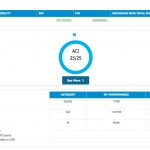
sdecoret/shutterstock.com
WASHINGTON, D.C.—In 2017, rheumatologists will begin to track and report quality data for reimbursement under the the Medicare and CHIP Reauthorization Act of 2015 (MACRA). Panelists shared their tips on how to score more points under MACRA and utilize existing technology at a Nov. 14 session called Implementing Quality Measurement in Your Clinical Practice at the 2016 ACR/ARHP Annual Meeting.
MACRA’s chief goal is to improve quality of care while decreasing healthcare costs, said Jinoos Yazdany, MD, MPH, associate professor of medicine at the University of California, San Francisco.
“This legislation had bipartisan support, so unlike the Affordable Care Act, MACRA may be here to stay,” she said. “The high-priority goals are patient-centered care, population health management, for practices to engage in continuous feedback and improvement, and to be able to demonstrate that you’re doing all of that.”
Most rheumatology practices will choose the MIPS (Merit-Based Incentive Payment System) track in MACRA for the first few years, said Dr. Yazdany. Under the MIPS option, providers must track and report on quality measures to the Centers for Medicare and Medicaid Services (CMS) in four domains: Quality Improvement Measures, Advancing Care Information, Clinical Practice Improvement Activities, and Quality and Resource Utilization Reporting, or cost.
Participation in MIPS can be done as an individual or a group, she said. Each measure earns points that make up a provider’s annual score, and each score will be compared on a decile scale to determine either a negative or positive payment adjustment for that participant in 2017. Based on feedback from physicians, The CMS has also included a “pick your pace” option for 2017, where rheumatologists can avoid payment penalties by reporting on just one measure.
Document to Earn Points
In the first year, the score will consist of 60% Quality Improvement Measures, 25% Advancing Care Information and 15% Clinical Practice Improvement Activities. Quality and Resource Utilization Reporting, or costs, won’t have an impact on quality scores in first year, but will rise to 10% by 2018, said Alex Limanni, MD, a rheumatologist at Arthritis Centers of Texas in Dallas. CMS made this change due to uncertainty about how costs for a particular patient should be attributed among different providers, he said.
In the first year, participants in MIPS will have to report only on a single measure to avoid a negative adjustment, the panelists stressed. In MIPS, there are 90 Clinical Practice Improvement Activities to select and report on, including “subcategories [that] center on concepts of extended patient access, population management, care coordination, beneficiary management, patient safety and practice assessment,” said Dr. Limanni.


